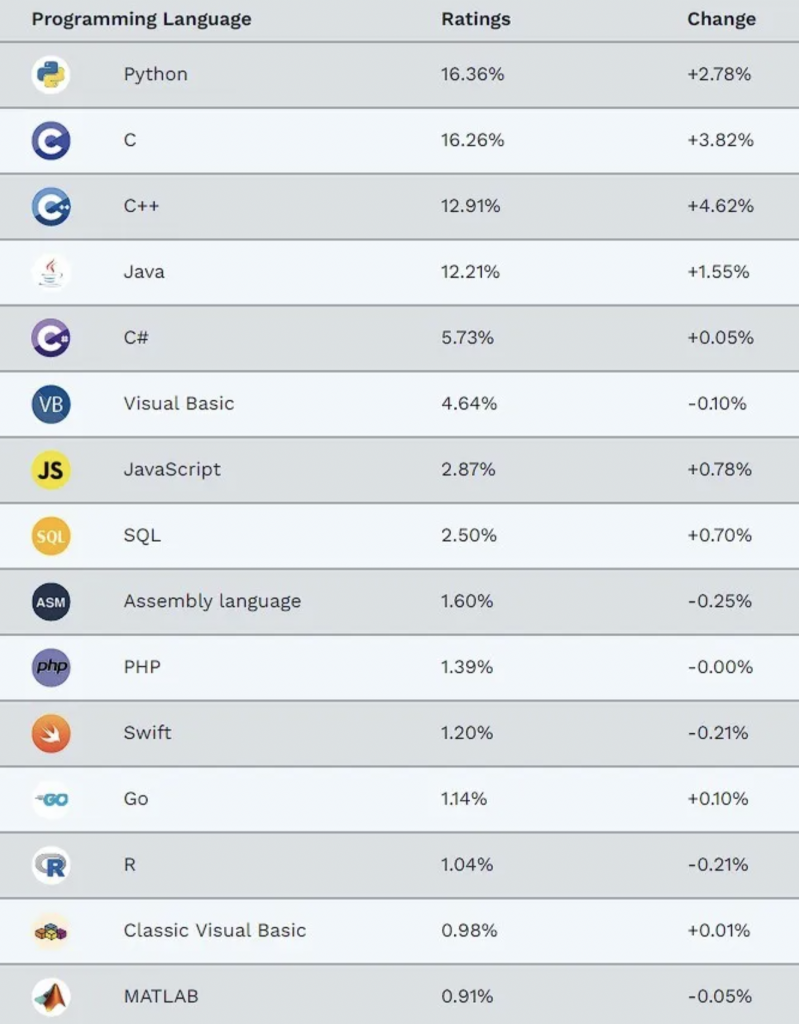2023 itibarıyla en popüler programlama dilleri, popülerlik sırasına göre aşağıdaki gibi sıralanabilir:
- JavaScript: JavaScript, tarayıcılarda web geliştirmek için kullanılan çok popüler bir programlama dilidir. Node.js ile sunucu tarafında da kullanılabilir.
- Python: Python, veri analizi, yapay zeka, web geliştirme, bilimsel hesaplamalar ve birçok başka alanda yaygın olarak kullanılan, kullanıcı dostu bir dildir.
- Java: Java, büyük ölçekli uygulamalar, mobil uygulamalar, kurumsal yazılımlar ve oyun geliştirmek için kullanılan platform bağımsız bir dildir.
- C#: C#, Windows uygulamaları, oyun geliştirme (Unity ile), ve büyük ölçekli web uygulamaları için tercih edilir.
- C++: C++, düşük seviyeli sistem programlama, oyun geliştirme, gömülü yazılım ve yüksek performanslı uygulamalar için kullanılır.
- PHP: PHP, özellikle web geliştirmeye odaklanmış bir dil olup, birçok web sitesi ve web uygulaması için kullanılır.
- Ruby: Ruby, Ruby on Rails çerçevesi ile web uygulamaları geliştirmek için tercih edilir.
- Swift: Swift, iOS ve macOS uygulamaları geliştirmek için kullanılır ve modern bir programlama dili olarak öne çıkar.
- Go (Golang): Go, özellikle web sunucuları ve sistem programlama için etkilidir ve hızlı performans sağlar.
- Kotlin: Kotlin, Android uygulamaları için Java’nın alternatifidir ve Android geliştirme için giderek daha fazla tercih edilmektedir.

Bu diller, belirli projelerde ve alanlarda farklı avantajlar sunar. Popülerlikleri, kullanım alanlarına, topluluk desteğine ve özelliklerine bağlı olarak değişebilir. Bu nedenle, hangi programlama dilini kullanacağınıza karar verirken projenizin gereksinimlerini ve kendi yeteneklerinizi göz önünde bulundurmalısınız.
Hangi programlama dilini tercih edeceğinizi belirlerken aşağıdaki faktörleri göz önünde bulundurmalısınız:
- Proje Gereksinimleri: İlk olarak, projenizin gereksinimlerini değerlendirmelisiniz. Hangi tür uygulama veya yazılım geliştirmek istediğinizi belirlemek, doğru dilin seçilmesinde kritik bir adımdır.
- Topluluk Desteği: Popüler programlama dilleri genellikle büyük ve aktif bir topluluğa sahiptir. Bu, sorunlarınızı çözmek ve rehberlik almak için önemlidir.
- İş Fırsatları: Programlama dili becerileri, kariyeriniz için önemlidir. Hangi dillerin iş piyasasında talep gördüğünü ve hangi alanlarda iş fırsatlarının olduğunu araştırın.
- Öğrenme Kolaylığı: Programlama dilinin söz yapısı ve karmaşıklığı sizin için uygun olmalıdır. Daha önce programlama deneyiminiz varsa veya tamamen yeni bir dil öğrenmek istiyorsanız bu faktör önemlidir.
- Güvenlik ve Performans: Projenizin güvenlik ve performans gereksinimlerini göz önünde bulundurmalısınız. Bazı diller güvenlik ve performans konusunda daha avantajlı olabilir.
- Geliştirme Araçları: Hangi programlama dilini kullanırsanız kullanın, kullanabileceğiniz geliştirme araçlarına ve entegrasyonlara erişim önemlidir.
- Mevcut Altyapı: Projeniz mevcut bir altyapı ile entegre olmalı mı? Örneğin, bir büyük kuruluşun mevcut altyapısı genellikle Java veya C# tabanlı olabilir.
- Kütüphane ve Çerçeve Desteği: Projeniz için ihtiyaç duyduğunuz kütüphane ve çerçeveler, dil seçiminizi etkileyebilir. Bazı diller, belirli uygulama türleri için daha fazla hazır kütüphane sunar.
- Gelecek Beklentileri: Hangi dillerin gelecekteki trendler ve teknolojilerle uyumlu olduğunu düşünmelisiniz. Özellikle hızla değişen bir sektörde çalışıyorsanız, dili seçerken gelecekteki kullanımını göz önünde bulundurmalısınız.
Latest posts by Ümit KÖSE (see all)
- Erzincan’da Yeni Kahve Noktası: EspressoLab Heyecanı Başladı! - 24 Eylül 2025
- DHI Saç Ekimi Hakkında Merak Edilenler - 12 Eylül 2025
- Protez Saç Nedir? - 31 Ağustos 2025




